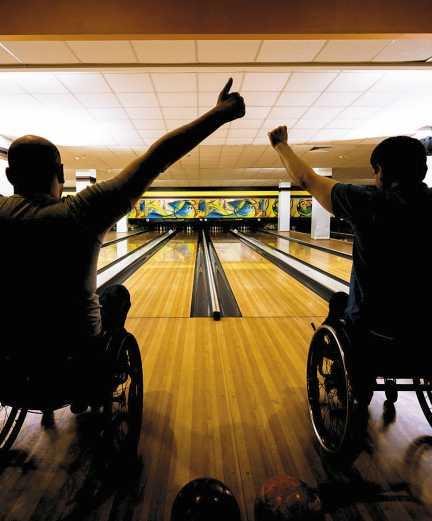
9 minute read
HEALTH
SCIENCE & HEALTH
Helpful tips for managing your mental wellness
Advertisement
Misty Barron
In the post New Year, when all the twinkling lights have been packed away and the holidays have come to a close, it can be easy to feel lost in the long winter nights and dreary days. Perhaps this is why January was chosen as Mental Wellness Month. The beginning of a new year is the perfect time to take stock of your mental health and learn new ways to improve your overall wellbeing. Here are a few tips to help focus on your mental wellness this month.
Get quality sleep
The American Academy of Sleep Medicine recommends between eight and ten hours of sleep per night for teenagers and more than seven to nine hours for those ages 20 and up. Sleeping well also refers to the time you rest and the quality of that sleep. Going to bed and waking up at the same time every day creates a schedule for your sleep.
Your phone could be causing you to have trouble falling asleep. Turn off all devices at least 30 minutes before bed. Blue light tricks the brain into thinking that it is daytime. When that happens, the body stops releasing melatonin which helps you fall asleep faster.
Stay active
Everyone knows that physical activity is good for the body, but it is also beneficial to the mind. Taking time to walk around the block or climb a few flights of stairs can reduce stress and improve alertness. A healthy routine will build confidence, heighten mental clarity, and even relieve symptoms of anxiety and depression when completed regularly.
Being active is more than physical activity, stay mentally active as well. When you focus on something pleasurable or challenging, your mind does not have time to dwell on negativity. Crosswords and word puzzles are a great way to keep your mind engaged. When done in moderation, even video games can help.
Jill delaney, traci morris, kathleen phillips and crystal gower enJoy lunch in delta cafeteria ; photo credit: onnie stone
Practice mindfulness
According to Mayo Clinic, mindfulness can help you experience thoughts and emotions with greater balance and acceptance. It can also help reduce stress, alleviate pain, and improve memory.
There are plenty of resources dedicated to mindfulness. You can also talk with a therapist or counselor. They can help incorporate this practice into your daily life.
Meaningful connections
In a world dominated by social media, you might feel disconnected despite the constant barrage of notifications. wNurturing relationships with family, friends, and even your pets will improve your mental wellness. The quantity of your relationships is not as important as the quality. Make sure the time spent with people you care for is engaging and in person. Time spent with someone who supports you and you feel loved by is good for your mental health as well as theirs.
Focus on the positive
Sometimes, finding the silver lining in a bad situation can feel impossible. However, you will stay focused on the negative unless you actively change your mindset. Start small and think of the little things that you might take for granted.
Get enough vitamin D
A human body produces vitamin D naturally when skin is exposed to sunlight. This becomes more difficult to do during the winter. A vitamin D deficiency may lead to a variety of mental and physical health issues, including depression.
Incorporating foods rich in vitamins into your diet is a good way to make sure you are getting enough. Fatty fish such as salmon and tuna, and egg yolks naturally contain vitamin D. Many other foods are fortified with vitamin D, such as milk, breakfast cereal, orange juice, and yogurt.
Supplements and sunlamps are another great way to ensure you keep your vitamin D levels healthy.
Be kind to yourself
Most people are their worst enemies, and it is easy to be hard on yourself when you are in a slump. Treat yourself just as you would a close friend, someone who deserves love and compassion. Rather than focusing on a deadline you missed, or an exam you did not do well on, tell yourself that it is okay to make mistakes. You would not tell your best friend that they were a failure, so do not tell yourself that either.
If you are used to being self-critical, it might be hard to imagine what being kind to yourself looks like. It may feel unnatural at first but remembering what it feels like to be kind to others will help.
In the post New Year, when all the twinkling lights have been packed away and the holidays have come to a close, it can be easy to feel lost in the long winter nights and dreary days. Perhaps this is why January was chosen as Mental
Did you know?
Delta offers mental health counseling. It's free, confidential, and available to all students. If you or someone you know needs help, contact their office one of the ways below. 989-686-9330 confidentialcounsel@delta.edu www.delta.edu/students/counseling/
Getting over the winter blues
La’Niya Jones
It is that time of year again, when the sun's light fades away and darkness welcomes the world in. You may feel like your days are slipping away as you fall into a state of sudden sadness.
Tis sudden feeling of sadness during the winter season is known as “winter blues,” more professionally called seasonal afective disorder (SAD). Why do people get the “winter blues,” and what are some ways to cure it?
Start by looking at the defnition of SAD. Seasonal afective disorder is defned as depression that comes and goes in a seasonal pattern, most commonly in the late fall through the winter season, hence the term “winter blues.”
A list of symptoms can be found on the Mayo Clinic website, including low energy, weight gain, oversleeping, sudden sadness, difculty concentrating, and many more.
Te “winter blues” are a pretty common thing. Research from Mental Health America states that, “In a given year, about 5% of the U.S. population experiences seasonal depression.”
What causes fve percent of the US population to go through this?
Te leading causes of the “winter blues” fall into the categories of serotonin and melatonin.
Serotonin is a chemical that sends signals to the brain and throughout the human body. Something that serotonin can afect is a person’s mood.
Melatonin, a hormone related to sleep, plays a signifcant role in your body’s biological clock. With the lack of sunlight comes a drop in serotonin levels, which drops your mood. According to Mental Health America, “Lower levels of serotonin have been shown to be linked to depression.”
With shorter days and more darkness than light, your body may think it is time to sleep. Tis can lead to sleeping problems and mood changes.
Tere is no way to cure SAD, but you can prevent it from worsening and help treat it briefy.
When it comes to treatments for the “winter blues,” it truly depends on the person experiencing them. During an interview with Unmun Kaur, she discussed the “winter blues” and how she has dealt with them.
How she would describe the “winter blues?” She talked about the feeling of sadness that she experiences when coming down from the adrenaline high afer the holiday season.
“I kind of don’t get over my winter blues; they kind of just go away afer about a week,” Kaur said. She doesn’t know the moment when they leave her, but she does know that she eventually feels better and can get back to being her normal self.
Take some extra steps this year to prevent the “winter blues” from getting out of hand. Be social with the people around you, sometimes all you need to feel better is good company. Focus on the positives going on around you; don’t get stuck in a negative mindset. Make sure you're still active in some shape or form, even if it's just walking around your room. Keep your environment warm, open, and welcoming, and try to get as much light as possible. Watch a movie, read a book, listen to music, or do whatever makes you happy to escape the cold breeze of this winter season.
autumn moreau enJoys coffee at live oak; photo credit: onne stone

Delta College project helping people receive mobility devices
Kayla Lugo
SAGINAW – Te gif of mobility is something many people take for granted every day. Te simple pleasure of being able to walk from place to place when one wants to is something that should not be taken lightly. Some people who are not as fortunate must have mobility assistance. Tat’s where Delta College’s mobility assistance project steps in. Students Helping Area Residents Exchange Devices has been helping residents of the Great Lakes Bay Region who are fnancially unable to obtain necessary mobility assistive devices for free since 2013. Delta College professor, Mike Spitz, is the advisor for SHARED. Even though the program mainly serves the GLBR area, an exception will be gladly made. “We are happy to provide devices to those in need outside our area,” Spitz said. “For example, we sent 100’s of devices to Africa to distribute to local hospitals in Kenya.” However, this program doesn’t help the community all alone. Tey collaborate with Delta’s Physical Terapy Association. “A huge part of physical therapy is about mobility, getting people moving again,” Spitz said. “Collecting and distributing assistive devices by our PTA students is a natural ft.”
Together, they accept donations of gently used assistive devices and other durable medical equipment that people don’t want before it ends up in landflls, refurbish them, and give them to people who need them but can’t aford to buy new equipment. Anyone can help SHARED. “Donate lightly used assistive devices and other DME that are no longer used by loved ones,” Spitz said. “Help spread the word that we ofer this program so that people who need devices and can’t aford them can get what they need to live a better life and get them moving again.” People can call project SHARED at (989)758-3621 to arrange a pickup or drop of. All donations made are tax deductible so that is an extra bonus. All that is required from those in need of assistive devices is confrmation from a healthcare professional stating the type of device needed and the individual’s weight-bearing status, if applicable. Even though SHARED does not host any community events, that is something Spitz looks to change one day. “I could envision creating a drop-of day where people could drop of their used devices and DME,” Spitz said. Anyone wishing for more information about SHARED or requesting mobility assistive devices can contact Mike Spitz at amspitz@delta.edu.



